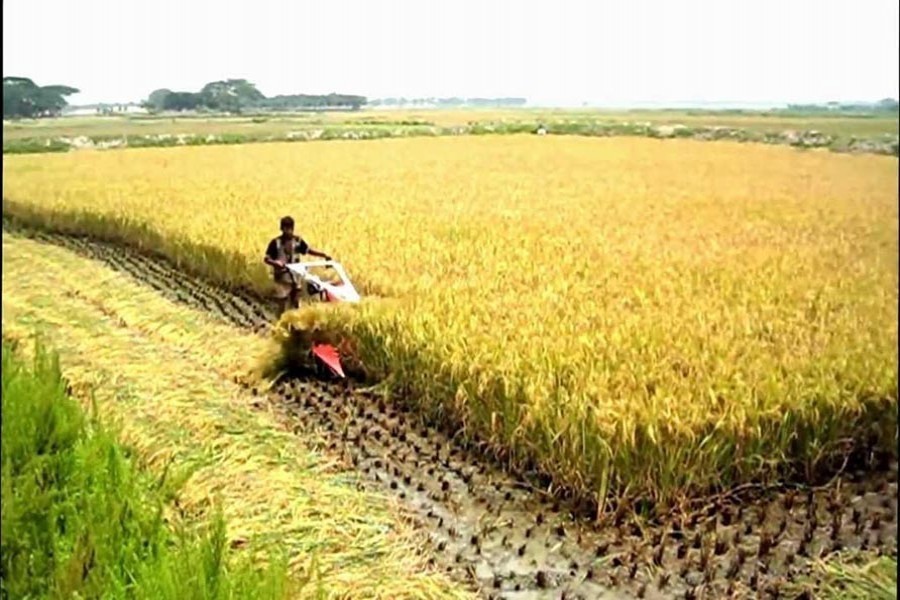Despite its declining share in the overall gross domestic product (GDP), agriculture still plays a pivotal role in Bangladesh's economy. A drop of one percentage point or more in its annual growth rate is enough to stir up deep worries among the policymakers. Any setback in production leads to a rise in the prices of agricultural commodities in the local market and causes import of the same at enormous costs.
The arable land area has been shrinking for the past few decades. And that process seems inevitable to accommodate the rising population and growing need for infrastructure of all types. Yet agriculture, in a broader term, has maintained a consistent growth between 3.0 and 3.5 per cent annually. If not crop production, farm sub-sectors such as poultry, fisheries and livestock have been making notable progresses in recent years.
Rice production matters most in the farm sector output. Consumers do usually spend more on other consumption items than rice. But the rice price has a psychological impact. Maybe, because of a couple of famines that had visited this part of the world---one in 1943 and another in 1974. That is why the rice price is also a politically sensitive issue.
As the area under rice cultivation expanded, production of many other crops has declined over the years and the country is now more dependent on their imports.
The increase in rice production in the country has been of remarkable high proportion. A country that could not produce enough food to feed only 75 million people during pre and post-liberation days is now almost self-sufficient in rice production. However, there exist a few confusions over rice production estimates because of the field-level data mismatch. That needs to be removed.
Introduction of improved farm practices, including the use of high-yielding varieties of rice, irrigation and fertilizers ---lately, farmers are picking up hybrid varieties with greater yield capacity---has made it happen.
Bangladesh was lagging far behind in the use of farm mechanisation, which is a bit cost-intensive compared to other regional countries. But the situation started changing in the late 1990s. Farm mechanisation is now going on in full swing thanks to the government's subsidy programme.
Farm machinery and implements such as tractors, power tillers, harvesters/ reapers etc., are a common sight in the countryside these days. The use of these farm machines has cut both time and cost for the growers. Preparing land and harvesting entail substantial costs because of the soaring wages of farm labourers. Farm labourers are now in short supply because of their extensive migration to urban areas, mainly to Dhaka, where rickshaw pulling fetches higher daily earnings.
This in a way is offsetting a possible problem of farm labour unemployment thanks to farm mechanisation. It was feared that extensive farm mechanisation would render many farm labourers unemployed. But the high wages of farm labourers do indicate that mechanisation has not yet created any such problem.
The government needs to monitor the process of farm mechanisation. It is noted that the use of modern farm practices is not happening in all the areas at the same pace. There are particular areas where farmers are more interested in using the same. The government needs to launch a motivational campaign in areas that are lagging behind.
The government deserves appreciation for extending subsidies to farmers who are buying farm machinery and equipment. But it needs to know the actual state of farm mechanisation. Its responsibility does not end in just providing subsidies. The agricultural ministry should ensure the use of farm machinery in all the regions of the country. Besides, it also remains important to see that farmers can reap the benefits of farm mechanisation at an affordable cost.
Small and marginal farmers dominate the country's farming community. They can hardly afford even subsidised tractors, power tillers, harvesters, etc. Some rural affluent people have been taking advantage of the situation. They are buying tractors, tillers, harvesters and renting them out. Allegations have it they are charging higher than justified rates. The benefit of subsidisation is going to this particular class of rural people. The charges have gone a few notches up following the recent hike in diesel prices.
No denying that the actual potential of the country's farm sector has not yet been fully tapped. The per-acre yield of any crop in the country is much lower than that of many other countries in South and Southeast Asia. An extensive introduction of modern farm practices can help the country tap its full potential. That will not happen automatically. The government will have to move in an organised manner to gather the right kind of information on agriculture and employ dedicated people to ensure the supply of goods and services to the genuine farmers, not others who are out to exploit the peasantry.


